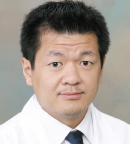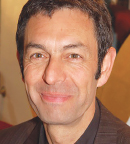Attendees at the 2016 Pan Pacific Lymphoma Conference held July 18–22 in Koloa, Hawaii, got a peek at early data for a number of novel agents in the treatment of various lymphoma subtypes. The ASCO Post captured these findings.
Denintuzumab Mafodotin in Diffuse Large B-Cell Lymphoma

Robert W. Chen, MD
Denintuzumab mafodotin demonstrated encouraging durable activity as a single agent in heavily pretreated (third-line or later) diffuse large B-cell lymphoma, according to Robert W. Chen, MD, of City of Hope, Duarte, California, and colleagues.1 Denintuzumab mafodotin is an antibody-drug conjugate composed of an anti-CD19 antibody attached to the microtubule disruptor monomethyl auristatin F. CD19 is rarely lost during malignant transformation or treatment, making it an ideal target for antibody-drug conjugate therapy, the investigators noted.
As monotherapy in the phase I study, denintuzumab mafodotin produced an overall response rate of 60%, with 40% being complete responses in relapsed patients with diffuse large B-cell lymphoma; median duration of response was 10.8 months in relapsed patients and 9.5 months in patients with refractory disease. The drug was well tolerated, with low rates of myelosuppression and peripheral neuropathy.
A phase II study of denintuzumab mafodotin in combination with RICE (rituximab [Rituxan], ifosfamide, carboplatin, etoposide) is currently enrolling 150 patients who are candidates for autologous stem cell transplant. The regimen is based on preclinical synergy shown for this drug in combination with rituximab.
Copanlisib in Follicular Lymphoma
Copanlisib, a pan–class 1 PI3K inhibitor, showed activity as a single agent in heavily pretreated patients with follicular lymphoma, with favorable complete response rates and durability.2 None of the patients in the phase I or phase II studies had progressive disease as a best response.

Barrett H. Childs, MD
The study by Barrett H. Childs, MD, of Bayer HealthCare Pharmaceuticals, Whippany, New Jersey, and colleagues enrolled 22 patients with relapsed/refractory follicular lymphoma; 12 had complete or partial responses to copanlisib, and 6 of them lasted at least 1 year. Serious treatment-emergent adverse events were reported by 45% of patients. The most common adverse events of any grade were hypertension, hyperglycemia, diarrhea, fatigue, and nausea.
In 10 patients, gene-expression data were available. Response to copanlisib was associated with a PI3K signature that included both the α and δ isoform genes and the BCR-signaling pathway. In an exploratory analysis of these patients, a high (above median) PI3K signature was observed in all four responders but was present in only one of six nonresponders. The patients with this gene signature also showed a trend toward longer progression-free survival.
The association of BCR/PI3K-pathway activation with response to copanlisib is consistent with the mechanism of action of the drug. It supports further investigation of dual PI3K-α and PI3K-δ inhibitors in relapsed/refractory follicular lymphoma, the researchers said.
Venetoclax in B-Cell NHL and Multiple Myeloma

Andrew D. Zelenetz, MD, PhD
Approved for the treatment of advanced chronic lymphoblastic leukemia (CLL), venetoclax (Venclexta), a selective BCL2 inhibitor, is being evaluated in other hematologic malignancies. Andrew D. Zelenetz, MD, PhD, of Memorial Sloan Kettering Cancer Center, New York, and colleagues reported the early results of a multicenter phase Ib study of venetoclax in patients with B-cell non-Hodgkin lymphoma (NHL), 89% of whom had received no previous therapy.3 Patients received venetoclax in a dose-escalated fashion in combination with CHOP (cyclophosphamide, doxorubicin, vincristine, prednisone) plus either rituximab (R-CHOP) or obinutuzumab (Gazyva; G-CHOP).
Novel Agents in Lymphoma
- Posters describing early results for several novel agents for lymphoma were presented at the 2016 Pan Pacific Lymphoma Conference in Hawaii.
- Denintuzumab mafodotin, an antibody-drug conjugate, produced an overall response rate of 60%, with 40% being complete responses, in a phase I study of patients with relapsed/refractory diffuse large B-cell lymphoma.
- Copanlisib, a pan–class 1 PI3K inhibitor, showed activity as a single agent in heavily pretreated patients with follicular lymphoma, with promising complete response rates and durability. Genetic profiling showed that response was associated with BCR/PI3K-pathway activation.
- Venetoclax, a BCL2 inhibitor, was combined with CHOP plus either rituximab or obinutuzumab in a group of mostly treatment-naive patients. The response rate was 95%, including high response rates among poor-prognosis subsets. Venetoclax was also evaluated in relapsed/refractory multiple myeloma, in combination with bortezomib/dexamethasone, and produced a 58% response rate.
Three-quarters of the 46 participants completed venetoclax treatment; 12 discontinued treatment, mostly due to adverse events. The most common toxicities were neutropenia, nausea, fatigue, and diarrhea. Grade 3/4 neutropenia occurred in 50% and febrile neutropenia, in 26%. Tolerability was improved with dosing modifications; efforts to further refine doses and schedules are ongoing.
Among 37 patients evaluable for response at the end of treatment, the overall response rate was 94.6%; by treatment arm, responses were achieved by 90% of those receiving R-CHOP/venetoclax and 100% of those receiving G-CHOP/venetoclax. Complete response rates were 70% and 76.5%, respectively. High response rates were observed in the poor-prognosis population of diffuse large B-cell lymphoma with coexpression of BCL2 and Myc—ie, so-called double-expressors.

Philippe Moreau, MD
Other investigators evaluated venetoclax monotherapy and in combination with bortezomib (Velcade)/dexamethasone in relapsed/refractory multiple myeloma. Philippe Moreau, MD, of the University Hospital Hôtel Dieu, Nantes, France, and colleagues reported on the combination in a phase Ib study of 54 patients.4 They observed responses in 58% overall, including 84% of patients sensitive to bortezomib and 16% refractory to the drug. By prior line of therapy, response rates were 84% after one to three prior lines and 44% after four to six prior lines.
The highest response rate, 91%, was observed among patients not refractory to bortezomib who had received only one to three prior treatments. Exploratory biomarker analysis demonstrated that higher BCL2 gene-expression levels at baseline were associated with improved response to treatment. This regimen will be evaluated in a phase III trial.

Shaji K. Kumar, MD
Shaji K. Kumar, MD, of the Mayo Clinic, Rochester, Minnesota, and colleagues reported that venetoclax was also active as a single agent, though response rates were lower in their phase I study of 66 patients with previously treated multiple myeloma.5 The overall response rate was 21%, with 15% of patients achieving very good partial responses or better. The highest response rate, 40%, was found in patients with t(11;14) alterations. The median duration of response in this subset was 10 months. It is important to note that several of these patients achieved a complete response with single-agent venetoclax. An expansion of this trial is currently evaluating the impact of adding dexamethasone to venetoclax. ■
Disclosure: Drs. Chen and Childs reported no potential conflicts of interest. Dr. Kumar’s institute received research funding from AbbVie.
References

